Growing Blog
Candidates For Cultivation: The King Oyster Mushroom
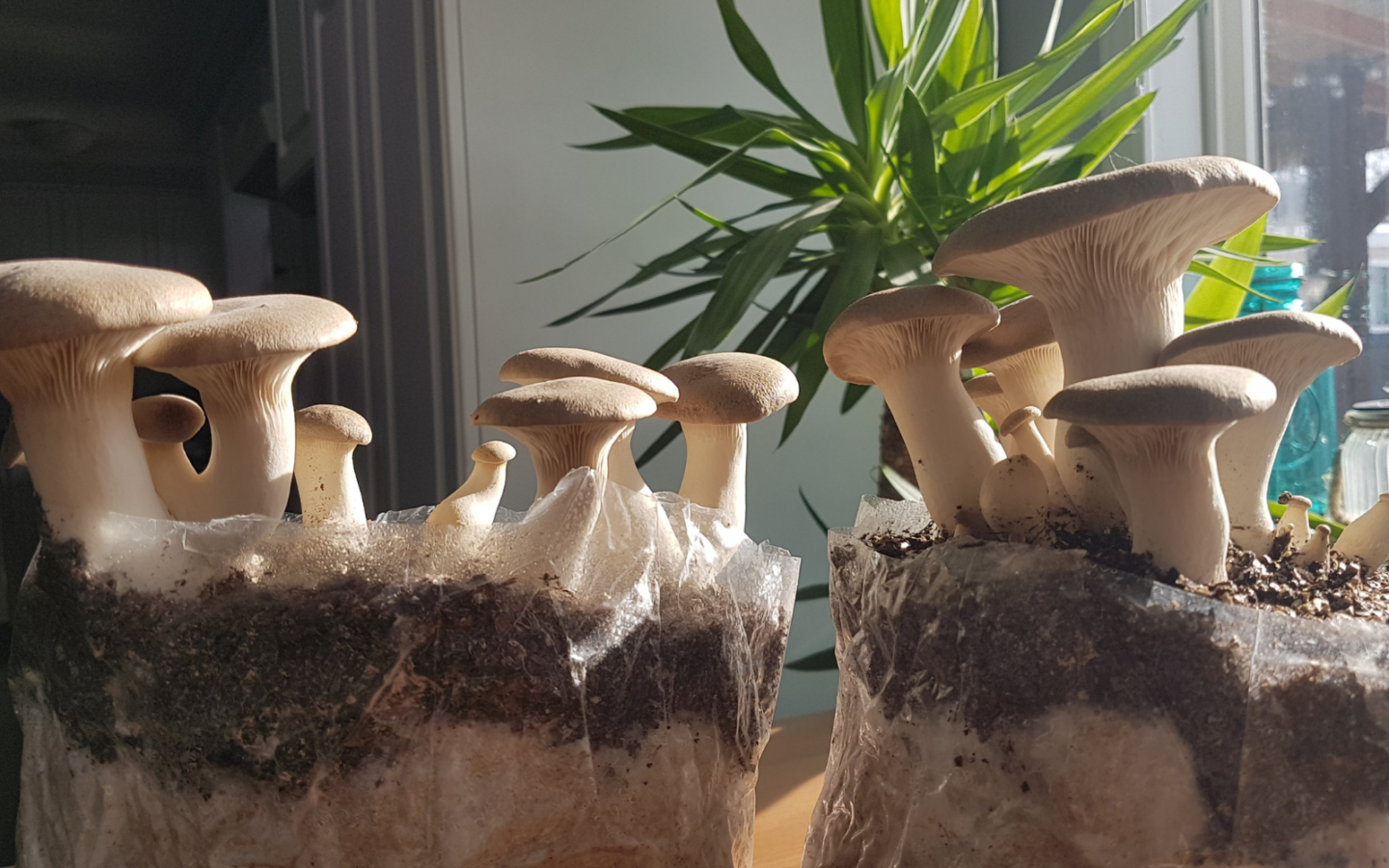
Contents
Oyster Mushrooms come in a dizzying variety of colors, shapes and sizes. One true standout is the king oyster mushrooms. Unique in many of its characteristics, the King Oyster has a stately appearance and culinary flexibility making it well deserved of its name.
Scientific Name: Pleurotus Eryngii
General Description
Unlike other oyster varieties, the King Oyster doesn’t usually produce a shelf like formation, but instead produces a mushroom with a round cap and a defined stem.
The cap usually unrolls with age, becoming flat and eventually uncurled. If grown indoors with minimal fresh air and low light levels, the mushroom will grow a fat tall stem and a tiny cap, while lots of fresh air and light will produce a mushroom with a small stem and large dark cap.
King Oysters can be quite large, sometimes producing single fruits weighing well over one pound.
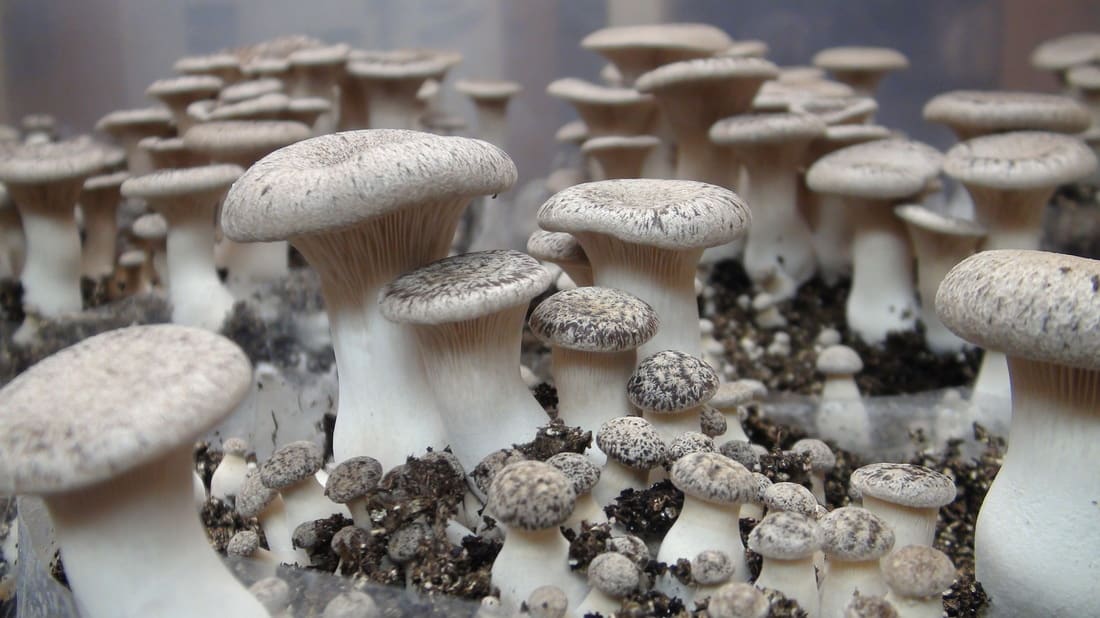
King oysters growing indoors.
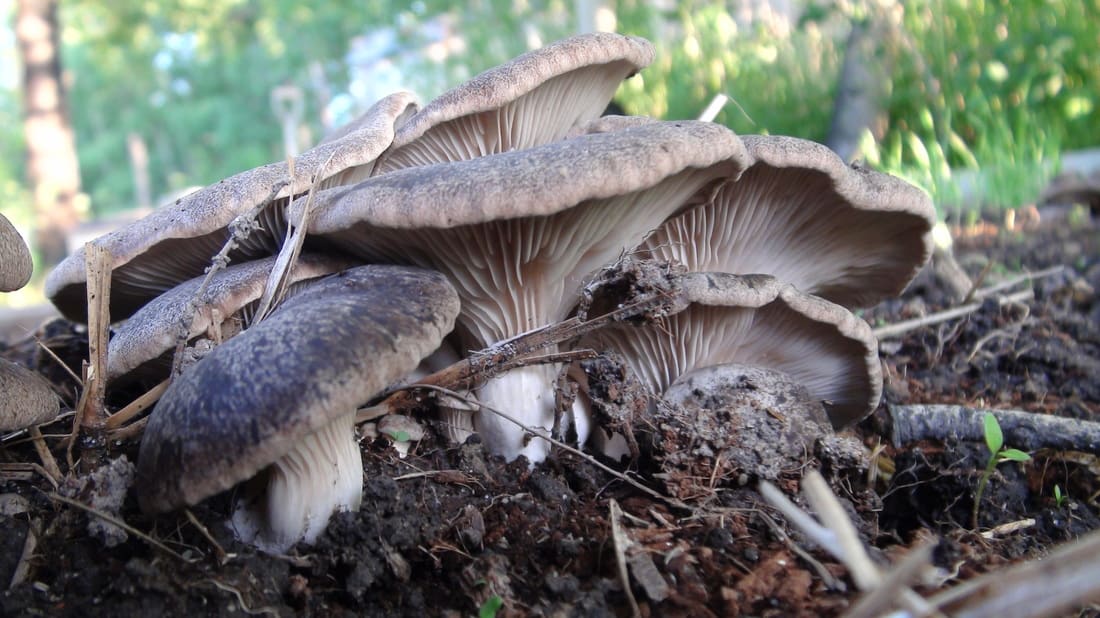
Genetically identical, growing outdoors.
Natural Habitat: Found growing from the roots of hardwood trees, emerging from underneath the soil. Can be found in Southern Europe, North Africa, Central Asia and Russia.
Difficulty: Medium.
Agar: King Oyster mycelium grows vigorously on Malt Yeast Agar. Growth is somewhat slower than other Oyster species. Mycelium appears thick and fluffy. Sometimes rhizomorphic.
Spawn Types: Grains, especially Rye. Can also use millet, or wild bird seed. Hardwood sawdust is also an effective spawn medium.
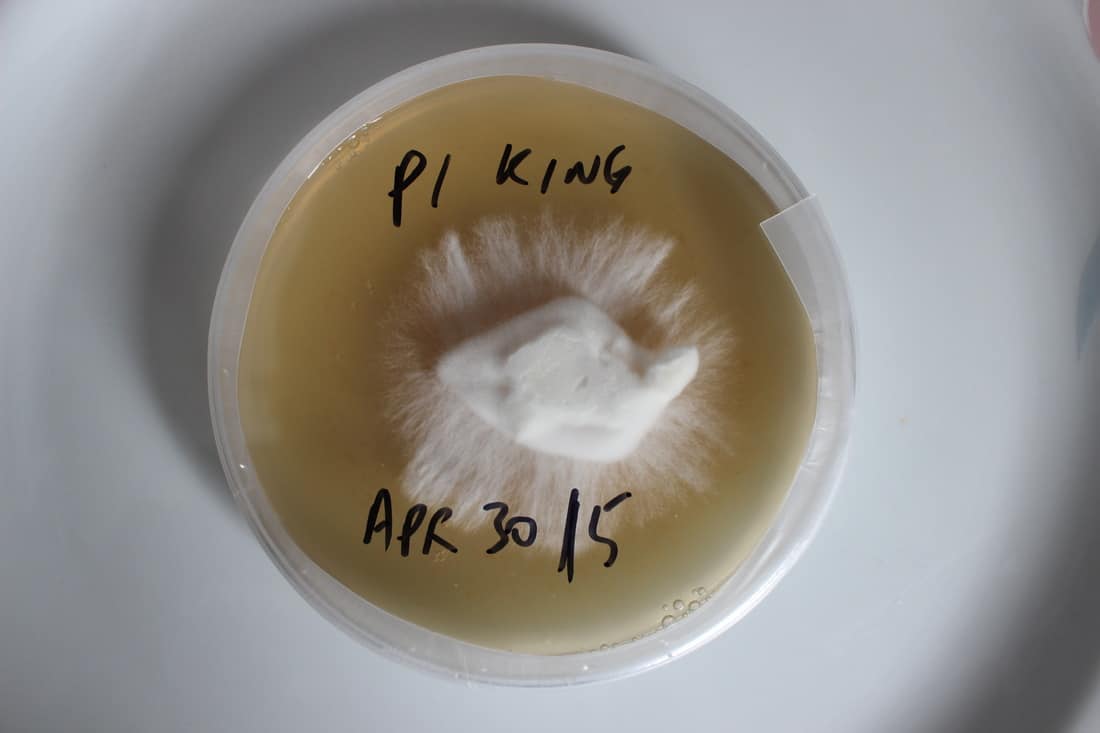
King Oyster growing out on Agar.
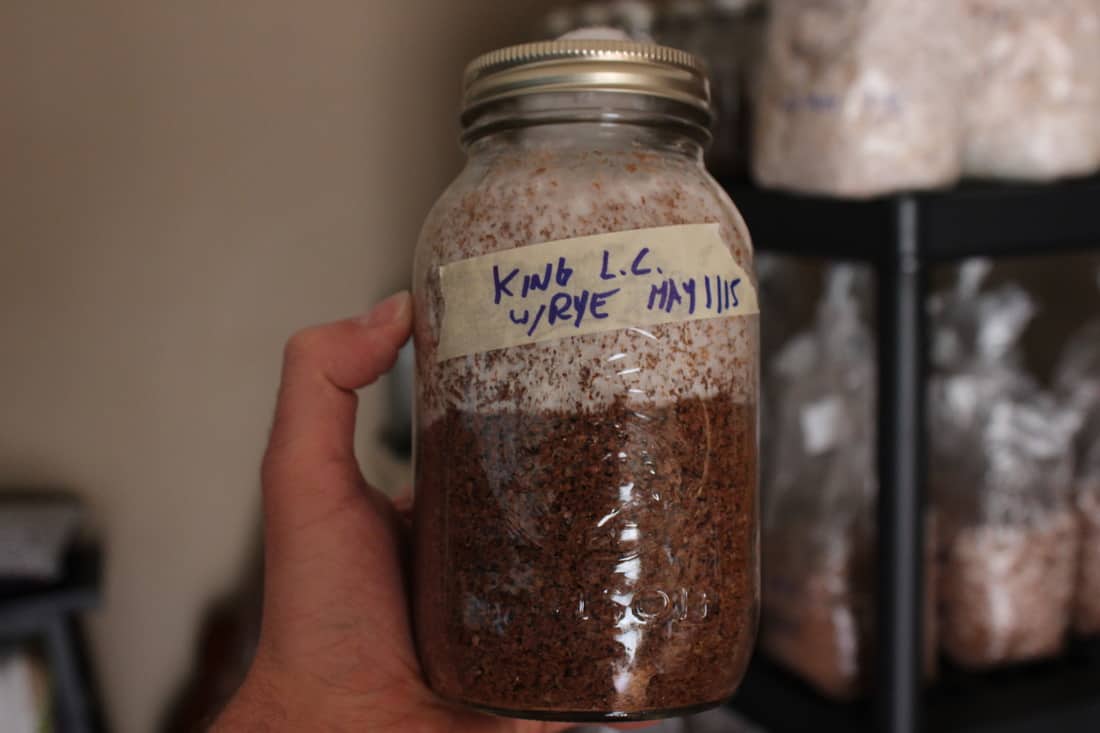
A liquid Culture of King Oyster growing through sawdust.
Substrate Types: King oyster grows best on supplemented hardwood sawdust in autoclavable grow bags. Supplement with wheat bran at 10-15%. King Oysters will also grow well on straw, however, unlike other Oyster species, the yield will be reduced.
Cultivators also report that the King Oyster will have a longer shelf life and a better texture if grown on hardwood sawdust rather than straw.
Fruiting Containers: Large gusseted autoclavable grow bags with a filter patch will produce the best results. For straw logs use poly tubing. Can also be grown with success outdoors in garden beds.
Casing Layer: Unlike other Oyster mushrooms, the King Oyster will benefit from a casing layer. Use 50/50 peat moss and vermiculite with 1% hydrated lime to prevent casing contamination.
Yield: Typically, 1 lb can be grown from a 5 lb supplemented sawdust block on the first flush. Multiple flushes can be achieved. Some cultivators get 2 lbs from a block on a single flush.
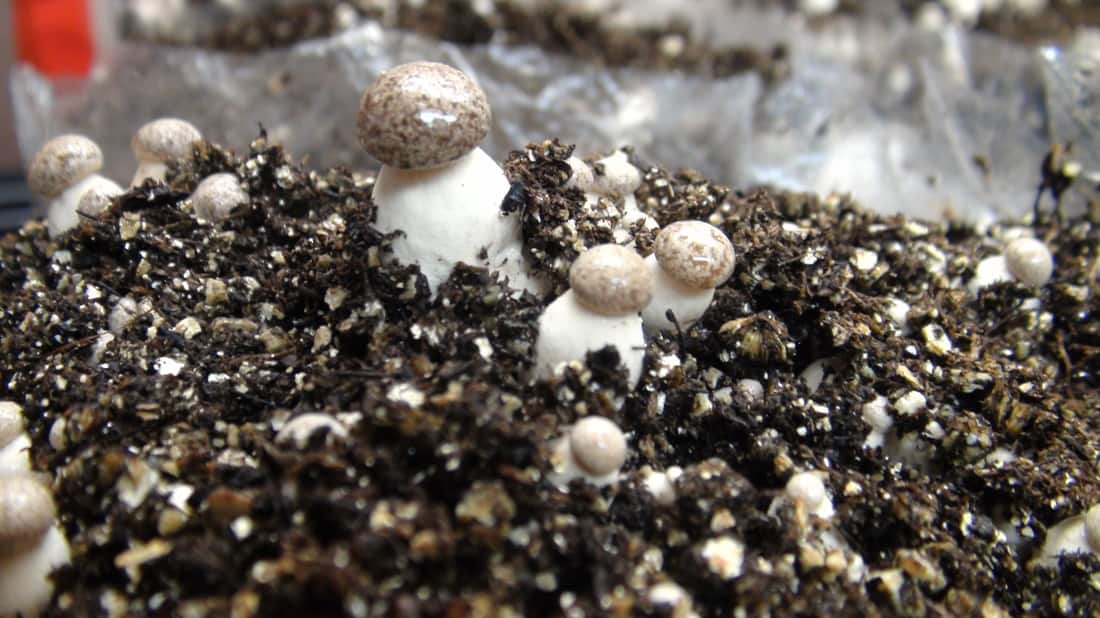
Baby King Oyster Emerging from a casing layer.
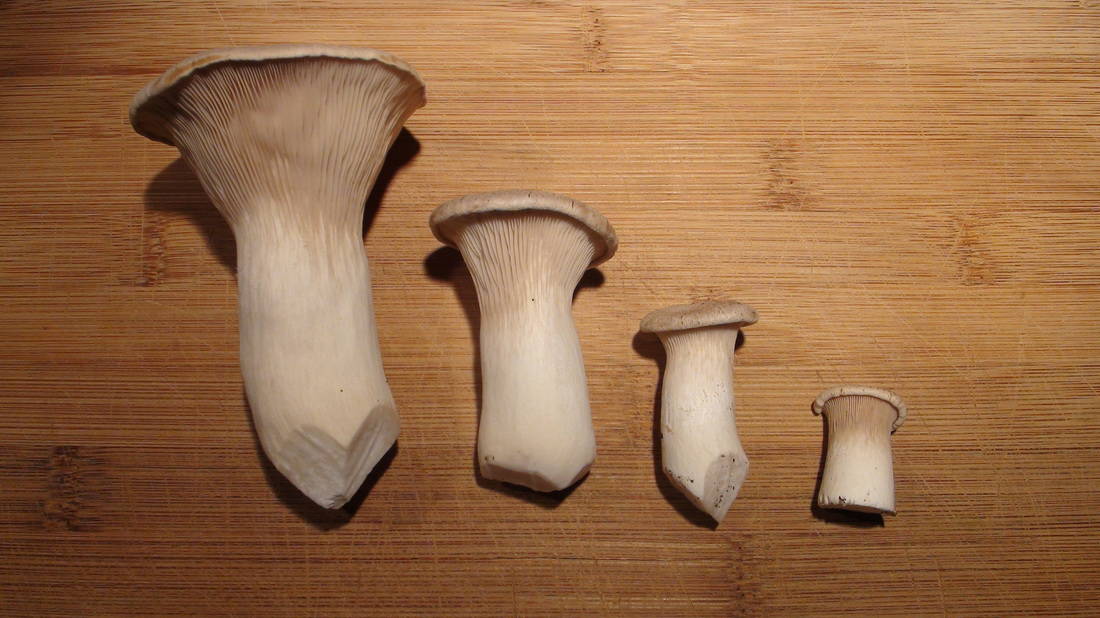
Indoor grown King Oysters at different stages of development
Harvest: When to harvest the King Oyster depends on cultivators preference. Smaller younger mushrooms will generally have a better texture and flavor, but less yield will be achieved. King Oysters are unique among oysters in that the stem is highly desired for culinary uses, so allowing the stem to grow large may be desired. Harvest by removing the mushrooms at the base of the stem, being careful not to damage the top of the block if subsequent flushes are desired.
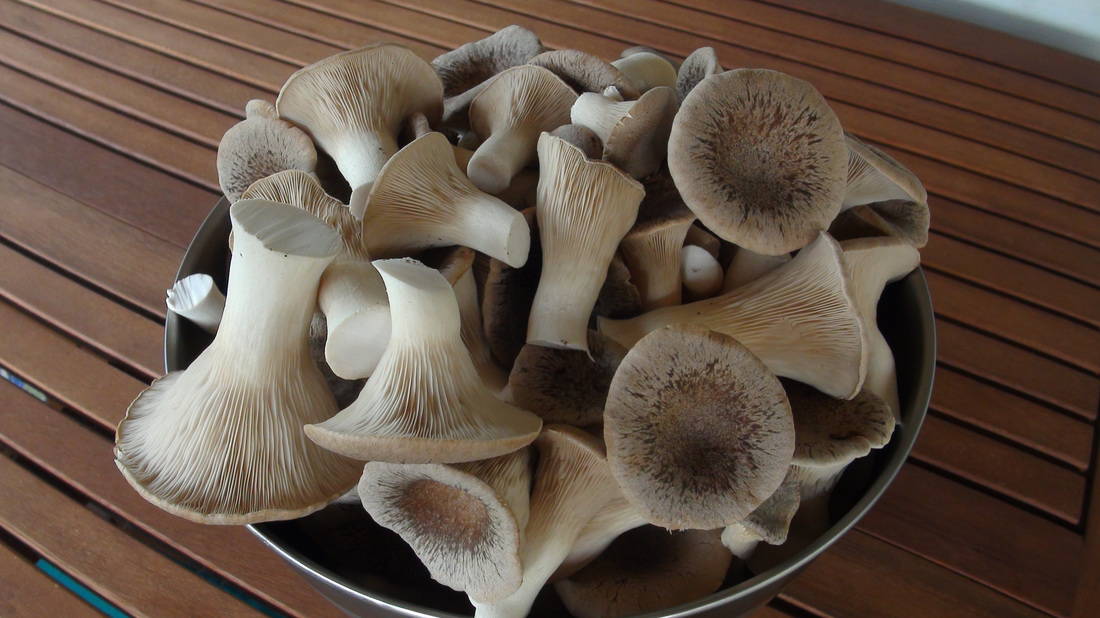
Freshly harvested King Oyster Mushrooms. Grown indoors. Yum.
Weakness: King Oysters are generally resilient against contamination but can be susceptible to blotch. Blotch is a bacterial infection generally caused by excessive humidity. It is shown by dark spots on the mushroom fruitbody. Remedy by reducing the humidity and ensuring water droplets do not remain on fruitbody for too long. Increase air exchanges.
Cooking: King Oyster mushrooms have a thick meaty texture and a bold unique taste. They are quite versatile and highly desired as a culinary treat. The thick texture will even stand up to grilling on a BBQ!
The Specifics
Spawn Run:
Incubate the grain spawn at room temperature (20-22 deg C) until full colonization. Should take 10-14 days for full colonization.
Initiate Pinning:
Expose fruiting container to lower temperatures (15 deg) and high humidity (95-100% RH). Increase fresh air.
Fruit Development:
Temperatures between 15-18 deg C. Lower humidity slightly but maintain above 80%. Fruits develop in 4-8 days.
You will not be disappointed choosing to grow King Oyster! The ones you grow at home will generally be much more delicious than the imported ones you can buy from the grocery store.
They are fun to watch grow, as they grow large and relatively fast. They store for much longer in the fridge than typical oyster mushrooms, sometimes lasting for longer than 2 weeks. You can have fun altering the growing conditions to produce vastly different looking mushrooms.
Overall, the King Oyster mushroom is a perfect candidate for cultivation.
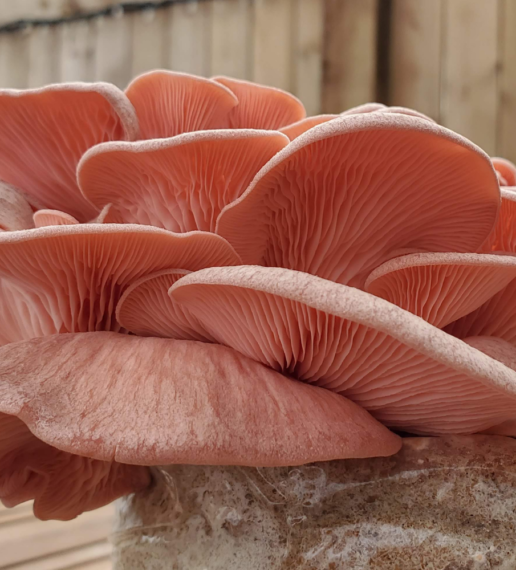
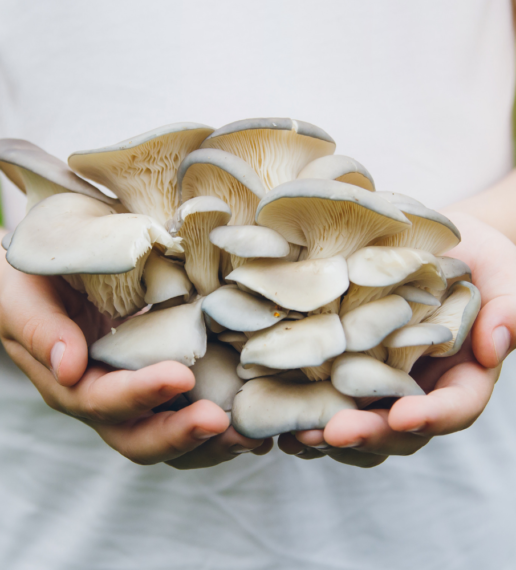
Do you pasteurize your casing layer?
Hi Kerem!
Yup, it’s a good idea to pasteurize the casing layer. I also like to add a little bit of hydrated lime. These two things together will go a long way towards keeping your casing layer to get contaminated.
Once your casing layer is mixed and water is added to “field capacity”, pasteurize around 75 deg C for an hour. The easiest way to do this is to place your casing inside a filter patch grow bag and pasteurize on the stove. You will need to place a weight on top on order to hold the bag mostly under the water, but try to keep the filter aboove the water line.
Hope that helps!
Hello, how long should it generally be to the initiate Pinning stage, after you have spawned to the substrate??
Thanks!
It depends on a number of factors, but generally anywhere from 10-14 days. If you have a high spawn rate, and good mixing, it will be closer to ten. Sometimes you can leave it in the bag for a number of weeks before you fruit them, but kings will readily form pins on the top of the block under the bag.
Oh, and at what point do you add the casing? 🙂 Thanks!
Hey Sue! Right before I put them into the fruiting chamber- so pretty much as soon as they are ready to fruit and the top of the bag is cut off. I add about 1 inch deep peat moss pasteurized and treated with lime.
Thanks so much for “both” your answers Tony! Since my spawned kings are looking fully colonized and are 16 days old, I’m going to go put them in my outdoor fruiting chamber, I’m so excited!!! I just started this hobby a couple months ago, bought a King culture syringe, started it on agar, then to rye grain jars and then to substrate of sawdust with BBQ alder chips, wheat bran, a little millet, coffee grounds, gypsom and cardboard, lol, I hope that wasn’t too many ingredients, but the bags look good! Thank you again for your quick reply!
Awesome! I wish you mush success- sounds like you are well on your way to growing some Kings! Outdoor kings are the absolute best. Let me know how it turns out!
I have Pins!! A few have brown heads, others are gray.. does that mean one of those colors are aborting? 2 more bags went into the greenhouse today too! I have never eaten (or even seen) a King Oyster so I can not wait to try them!
Exccellent! Good job! The pins can vary in color, so I wouldn’t worry about it too much. Sometimes they will abort if it is too dry, other times they will just abort to let the bigger ones grow. Good luck!
They started to flatten out and I picked them (just the bigger flattened ones) and ate them! They ARE delicious! I had a very nice helping of them, sauteed with a tiny bit of spices and garlic. I’m so glad my first bag was a success, thank you for you help! My Shiitake are starting to fruit too!
Way to go sue! It’s always satisfying to pick your own home grown mushrooms! Good luck with the Shiitake-
You guys! I am just doing this now. I have fully colonized rye grain. I bought straw and the bags, but I was wondering, do you ever skip the bag state and perhaps grow in a bin? The bags I bought are a little smaller than expected, but they have the patch on them. Thanks in advance. I hope you see this and answer!! 😀
Hi there
Do you scratch your Kings and if so is it before or after pinning. Thank you.
Hey Dave! No, I don’t scratch the top. I have tried it in the past, but it doesn’t seem to make a difference for me. I know some people do though, and get improved pin sets on the block, so your miles may vary.
Hi! I was wondering if there are any reasons for using bags instead of beds to hold the substrate.
Thanks
Hey There!
I like to use bags because it is easier to sterilize and compartmentalize. If you just do one large bed, it would be difficult to sterilize all the substrate and keep it sterile while it is colonizing. Also, if you do get contamination, its much better to get it in just one bag that you can toss rather than a whole bed.
Does the King Oyster grow well on coffee grounds?
Hey Victor!
I would be hesitant to grow on straight coffee grounds. You might instead try to add coffee grounds to another sitable substrate as a supplement. I know people have had success growing regular oysters on coffee (Pleurotus ostreatus) but not sure about eryngii. Coffee is prone to contamination.
i purchased some king oyster and live in the Caribbean. i am now seeing the temperature requirements for fruiting. Do you think if i watered with cold water it would fruit.
Hi! Have you ever seen a good amount of fuzz when you cut open the bags for fruiting? Is it mold? Any ideas what keeps causing our kings to have this? All of our other varieties have been great except we keep getting a large fuzz layer on our kings after 3 weeks of colonization or is this the kings mycelium?
Thanks!
Any tips?
Hey Sarah! This is likely just aerial mycelium, can happen in really moist conditions. I’ll often get mycelium working it’s way up from the top of the block on many species of oyster.
I read that King Oysters need a cold shock to start pinning. Can I put the colonized bag in a large ice chest/cooler with some ice to get the shock? Too extreme? I am only a basement grower and air conditioning out of the question. Any other ideas?
Hey Dale! In my experience, Kings do not need a cold shock pinning trigger. If you have trouble pinning kings, it could be a strain issue.
Will my kings grow if my temperature is above 65 degrees F? My basement isn’t that cool right now and other than adding a fan, I don’t know how to make it any cooler. Any suggestions? Something I can rig up? Thanks!
Good morning from Spain. In my area Pleurotus Eryngii growes naturally. There are some errors in your article regarding where and how they grow wild.
Pleurotus Eryngii usually appears on plains without trees, and ever associated with a kind of thistle called “Eryngium Campestris”.
Otherwise it is an extraordinary article that have helped me to get fruiting from a wild mycelium. Thank you very much.
Thanks for the input 🙂
Hi, I’m from Makedonia. I would like to grown king oyster on straw. I saw you video few weeks ago,but I couldn’t find it now. Please tell me which way is better -on straw or hardwood sawdust.
Hey there! King Oysters do OK on straw, but certainly better on sawdust IMO
Hi Tony. I’m growing Kings (or trying) in my garage. Built an airtight cubboard with an always on 900 Lumen (led) lightbulb inside with an air conditioner pumping cold air at ~17/18 degrees C inside. Humidity sensor shows ~70%. Bags grew for about 18 days (white mycelium on top) before I put them in. It’s 5 days now and I see ZERO signs of pinning.
Should I just hold out or try change a parameter?
Hey Stuart! I would try to increase the humidity for sure, or apply a casing layer. Sounds like the top may have dried out. Hope that helps!
I thought I would give an update on that situation 3 months back:
So, it never fruited into Kings 🙁 It fruited into another type of fungi! So it seems whatever it was has slipped in somewhere in at the start because all my bags ended up having it!
I have since started a new batch from scratch with new mycelium on agar/grain spawn/substrate and have finally been able to see some ACTUAL King Oyster pins – and they are growing now 😀
Using a fruiting chamber inside the cupboard gives more humidity as well (80%+), no casing layer.
Good job. I could use some tips, Stuart! I have colonized jars and got some straw and bags and now I read Tony talking about sawdust, but I cannot get my hands on that. I now need to decide if we are going to try this in bags or in a plastic bin. I prefer the bag idea.
I feel dumb here, but is a casing laying something like vermiculite? Thanks again. Lots more questions for you guys!
Yes, a sterile non-nutritious layer used to retain moister.
Hi! Awesome blog !! thanks for so much information !!!
Could be posible grow in the same tent (same environment) Pleurotus ostreatus (Winter Oyster Mushroom) and Pleurotus eryngii (King Oyster Mushroom)? not for own consumption, thinking on start a little business ! ( I have some experience on oyster no king oyster).
what bags are best for king ? T bags? If it is like that, what number?
thanks you very much !
Good Morning Respected Sir, I am in India, at Chennai. I am a mushroom cultivator also, i want mushroom spawn all kinds of varities. I like your youtube videos,very super and Nice .
First night in tent inside cellar. Temp is high at 24c. Tomorrow will be cooler.Wish me luck.
ok though the site initially has the feel of one of those recipe website full of aids (adds) and little insight, it is anything but. And i thank you for this information and doing it with such diligence.
If I autoclave the sawdust and rice bran mixture then how will I add king oyster spawn to the autoclaved bags
I also use Hardwood Pellets and Rice Bran. You will need to spawn with a flow hood… Or I’ve been successful in a SAB.
Hi, I have been learning a lot of dos and don’t in my home shrimp room…. but enjoying it all. One issue I am stumped with is that all of my king oyster grow blocks have produced only small mushrooms with thick stalks and very tiny heads. They still taste good… but at best, they are only the size of my thumb, most smaller. Any suggestions? Thanks
I have ran King blocks in a Mini Greenhouse(Martha) and Kings are great to learn from and dial in your Fresh Air Exchange. I did ok uncased, but many aborted, added casing to second flush and less fruit, but bigger. I also know the Kings liked me upping the FAE. Within a day a HUGE difference in Growth. Happy Growing!
Hi, I am from Cyprus, and where I live,wild king 0yster grows. My question is, can I make spawn out of them,and if yes,how?
You would have to make a spore print, or clip a specimen and bag it for taking a Clone later. Then to AGAR or make a Liquid Culture or Multi-Spore syringe if printed.
Thanks for your reply
I have started cloning on agar ,but though the specimen started making mycelium, it didn’t ‘expand ‘ on agar.What might have gone wrong?
Did you take the sample from the middle of the stem. If you did, maybe a dry AGAR plate. Did you only do one plate?
Can I make liquid culture from specimen?
I have seen where you can use a syringe to do a straight tissue sample to LC(scalpel would work), but I have no real world experience with that technique. I’m an AGAR plate guy, I prefer to start with a worked culture, usually more than one transfer.
The sample started “glooming”.
I made 3 times × 12 plates.All the same
Can I make liquid culture from specimen?
What are the causes of king oyster cap atrophy?
Hey Tony. First off all great site and content you guys put out. I have a question around storage of king oyster spawn? I know pink oyster is not advisable to store refrigerated but what about Kings? I have some king spawn due to arrive soon but I’m not ready to inoculate yet? Will they keep at low temps for a while before I’m ready to use? Thanks. Karl
Have the color some relation with temperature or light? Thank you!
How watering is done in king oyster grow bags?
Sir how to make casing